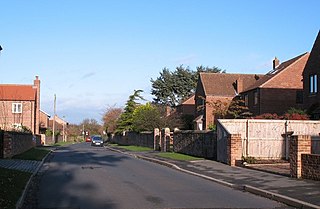
West Yorkshire is a metropolitan and ceremonial county in the Yorkshire and the Humber region of England. It borders North Yorkshire to the north and east, South Yorkshire and Derbyshire to the south, Greater Manchester to the south-west, and Lancashire to the west. The city of Leeds is the largest settlement.

Morley is a market town and a civil parish within the City of Leeds metropolitan borough, in West Yorkshire, England. Morley is the largest town in the borough after Leeds itself. Morley forms part of the Heavy Woollen District.

Harrogate is a spa town in the district and county of North Yorkshire, England. Historically in the West Riding of Yorkshire, the town is a tourist destination and its visitor attractions include its spa waters and RHS Harlow Carr gardens. 13 miles (21 km) away from the town centre is the Yorkshire Dales National Park and the Nidderdale AONB.

Temple Bar was the principal ceremonial entrance to the City of London from the City of Westminster. In the Middle Ages, London expanded city jurisdiction beyond its walls to gates, called 'bars', which were erected across thoroughfares. To the west of the City of London, the bar was located adjacent to the area known as the Temple. Temple Bar was situated on the historic royal ceremonial route from the Tower of London to the Palace of Westminster, the two chief residences of the medieval English monarchs, and from the Palace of Westminster to St Paul's Cathedral. The road east of the bar within the city was Fleet Street, while the road to the west, in Westminster, was The Strand.

Hemsworth is a town and civil parish in the City of Wakefield, West Yorkshire, England. Historically within the West Riding of Yorkshire and had a population of 13,311 at the 2001 census, with it increasing to 13,533 at the 2011 Census.
Woodlands is an area of Glasgow, Scotland. Situated on the north-west edge of the city centre, Woodlands is located within Glasgow's fashionable West End, east of Hillhead, south of Woodside, north of the Park District and Kelvingrove Park, and west of Charing Cross and Garnethill.
The Ainsty or the Ainsty of York was a historic district of Yorkshire, England, west of the city of York. Originally a wapentake or subdivision of the West Riding of Yorkshire it later had a unique status as a rural area controlled by the corporation of the city.

Rufforth is a village in the civil parish of Rufforth with Knapton, in the unitary authority area of the City of York in North Yorkshire, England. It lies about 4 miles (6.4 km) west of York. The village is mentioned in the Domesday Book and dates from Saxon times.

Escrick is a village and civil parish in North Yorkshire, England. It was in the historic East Riding of Yorkshire, but since 1974 has come under North Yorkshire. It is approximately equidistant between Selby and York on what is now the A19 road.

James Backhouse was a botanist and missionary for the Quaker church in Australia. His son, also James Backhouse (1825–1890), was also a botanist.

Endcliffe Park is a large park in the city of Sheffield, South Yorkshire, England. The park was opened in 1887 to commemorate the Jubilee of Queen Victoria. When travelling West from the city centre it is the first in a series of parks and green spaces, known collectively as the Porter Valley Parks, all of which lie along the course of the Porter Brook. The next park in the sequence is Bingham Park, separated from Endcliffe Park by Rustlings Road. In 1924 Patrick Abercrombie said of the parks, "The Porter Brook Parkway, consisting as it does of a string of contiguous open spaces, is the finest example to be found in this country of a radial park strip, an elongated open space, leading from a built-up part of the city direct into the country, the land occupied being a river valley and so for the greater part unsuitable for building."

Risby is the site of a deserted village and former stately home in the civil parish of Rowley in the East Riding of Yorkshire, England. It is approximately 3.5 miles (5.6 km) south-west of Beverley and 1 mile (1.6 km) west of the A164 road.

Peel Park is a 22.6-hectare (56-acre) urban public park in the Bolton and Undercliffe area of Bradford, England, located about 0.75 miles (1.2 km) north-east of the city centre, and named after Sir Robert Peel (1788–1850). Peel Park was Bradford's first public park and is on the English Heritage and National Register of Historic Parks and Gardens online databases. The park is a Green Flag Award winner and has been for a number of years.

The City of York, officially simply "York", is a unitary authority area with city status in the ceremonial county of North Yorkshire, England.

Royal Air Force Rufforth or RAF Rufforth is a former Royal Air Force station located near Rufforth in North Yorkshire, England. It was used by only one operational squadron on long-range bombing missions during the Second World War, with most flying dedicated to conversion units under the auspices of nearby RAF Marston Moor. Post-war, the RAF used the site to house maintenance units, gliding schools and observation flights. It was completely disposed of by the MoD in 1981, and now is used for civilian light aircraft and glider flying.

Holgate is a suburb of York in the ceremonial county of North Yorkshire, England. It is located about 1 mile west of Micklegate Bar in the city walls. Holgate is also the name of an electoral ward in the City of York unitary authority. The ward is currently bounded by the River Ouse from Scarborough Bridge to Ouse Acres on its northern boundary. Carr Lane and Ouse Acres on one side, and the intersection of York Road and Acomb Road on the other, make up its western boundary. The remainder of the southern boundary follows Moorgate and Holgate Beck to the East Coast Main Line railway which completes the eastern boundary as far as the River Ouse/Scarborough Bridge.

Knapton is a village in the civil parish of Rufforth with Knapton, in the City of York unitary authority area and ceremonial county of North Yorkshire, England. It is 3 miles (5 km) west of York and is bounded by the village of Acomb to the east, the B1224 to the south, the A59 to the north and the A1237 York Outer Ring Road to the west.

Blossom Street is a road in York, in England, immediately west of the city centre.

Holgate Beck is a small watercourse that flows north-eastwards through Holgate across the west side of the City of York, England. Primarily flowing through Holgate, from which it derives its name, the beck drains a large part of Askham Bog and Hob Moor, then running underneath the various lines near York railway station. It empties into the River Ouse at Water End, being one of five main tributaries for the River Ouse in York, and consequently added to the flooding in the river and immediate environs. To counter this, some flood diversionary schemes have been implemented near to Askham Bog and Hob Moor.


















